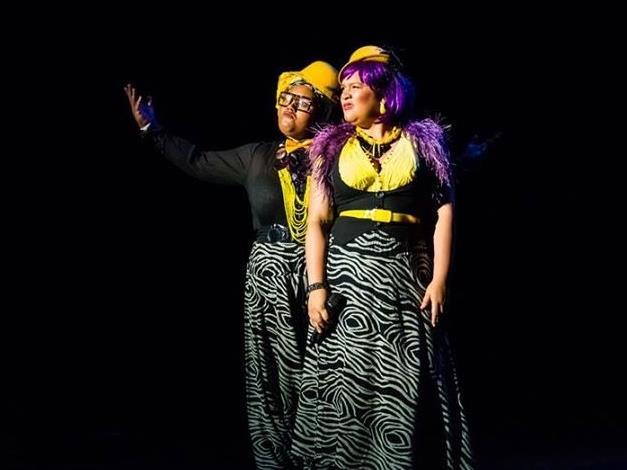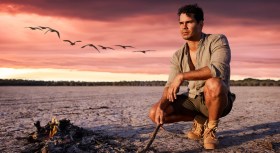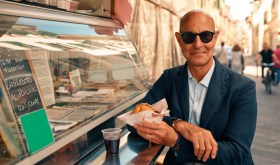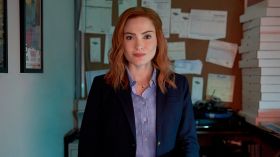Image: Candy Bowers and Kim “Busty Beatz” Bowers in action with Black Honey.
Having embraced its role in fixing the breathtaking imbalance between men and women in the screen sector, Screen Australia has now made concrete moves to deal with the wider diversity issue. The agency today announced the sixteen people who will participate in its Seeing Ourselves: Developing the Developer program.
As it said in the application announcement,
Seeing Ourselves: Developing the Developers will take on 10 to 12 successful applicants for the workshop in Sydney on Friday 31 March, Saturday 1 April and Sunday 2 April 2017.
The program will focus on development philosophies, methodologies and tools across fiction story platforms, as well as market context, with participants required to prepare work ahead of and during the workshop. Screen Australia will meet with participants after the workshop to discuss goals and help unlock opportunities in the story development field.
There were 89 applications and the agency extended its list from 12 to 16.
The full list is here and includes their accomplishments. The remarkable thing about the group is the scale of their accomplishments. In a way, the sector has opened a tiny gap in its armour to the wider world of creative people, and excellent candidates have poured through.
Six of the sixteen have substantial achievements in theatre. There are two documentary filmmakers and four writers, while six of them already have a background as producers. Most of them list multiple roles. Three of them in this group have chosen to identify as people with disability.
Thirteen of the sixteen are women. Around half can probably be described as non-European in background.
They are not in any sense aspirants, though they are shifting sideways. They are highly educated, and trail a small truckload of awards and honours. They are respected for their past work.
It is really important not to cast this story and project in terms of victimisation. They will generally talk about the discrimination felt by their home communities, which is built into the fabric of their lives but they won’t be negative about their own professional lives.
There is a thread of normalisation that runs through this list, of people who don’t want to be trapped in the same old stories of being a token, of being the other, of being no more than a brave refugee or disability story.
Instead, they will bring to the development process a much wider sense of lived experience, of Australia as a multi-cultural world, of audiences that rub together and confront each other and get along and endlessly negotiate the small stories of tolerance and contempt.
What they say to each other over those three days would be fascinating.
Screen Australia has found a way of making a difference at a point of central strategic importance, because successful development occurs in every project and sector, and underpins every success – and every failure – in screen storytelling. In a way the program offers a mirror to the sector. Can we see ourselves as the narrow minded pseudo-meritocracy we really are?
Or does this program offer up a great group of people to be ignored yet again?
Here they are:
Gary Abrahams, a theatre director, writer and dramaturge: ‘A gay male artist from a Jewish background, he has a strong sense of otherness and is devoted to the creation and production of stories for diverse audiences.’
Violeta Ayala is described as an ‘award winning filmmaker of the First Nations Peoples of the Americas.’ Known in Australia for Stolen, the documentary about a Polisario refugee camp, she has been working on South American subjects with support from Sundance, the MacArthur Foundation and Tribeca. ‘Violeta wants to produce for other filmmakers of colour and push for change in the Australian screen industry.’
Candice Bowers is a playwright, performer and activist from the Black Honey Company. ‘Born of multi-racial South African parents and raised in Western Sydney, her work is rooted in her outlier positioning… : Candy is interested in all forms of storytelling, and wants to shift the current paradigm to shape the next decade of diverse Australian stories.’
Elena Carapitis is an actress and playwright: ‘She is a proud member of the MEAA Equity Diversity Committee, passionate about championing people whose stories and points of view are not often seen, and is working to ensure all audiences see themselves represented on stage and onscreen.’
Jenevieve Chang is an actor, writer and movement director in theatre: aims to ‘address the absence of stories for women of colour, whose voices are distinctly contemporary and Australian.’
Santilla Chingaipe was born in Zambia, is a journalist and documentary filmmaker known to audiences through her work for SBS News: Santilla seeks to showcase migrant Australian stories as simply Australian stories, because she feels that many narratives – in an attempt to highlight diversity – highlight differences instead.
Martine Delaney is a long-time transgender advocate/LGBTI activist: ‘Martine wishes to contribute to diversity in the industry by bringing a decade of LGBTI advocacy to the table, and push open the door for future Australian Trans storytellers.’
Ade Djajamihardja is a television producer and executive from the ABC and South East Asia: ‘As an Asian Australian from a Muslim family, and as a stroke survivor living with a disability, Ade contributes a rich and unique perspective on inclusive storytelling.’
Mithila Gupta is an Indian-born scriptwriter who is working her way up through the television drama system: ‘Mithila’s career aim is to bridge the gap between Australia and India by creating a slate of co-productions.’
Patricia Morton-Thomas is an Indigenous writer, producer and actor with over 20 years of experience in film and television: ‘As a filmmaker from a minority background, Trisha has a strong sense of what is missing from our screens, and is committed to contributing a more diverse and truer reflection of Australia.’
Bali Padda, from a Punjabi family, is an actor, producer and consultant in theatre and television, and Chair of MEAA’s Equity Diversity Committee; ‘Bali is firmly committed to ensuring that our Australian stories are a true representation of contemporary Australia, in all its diversity.’
Fatima Mawas is a filmmaker in shorts and music clips: Fatima wants to tell challenging, entertaining and thought provoking stories reflective of true Australian culture, and featuring Muslim protagonists.
Mala Sujan, a child migrant born in India, has already worked on production and development in the screen sector for over twenty years: ‘Mala believes screen stories play an important role as a highly influential medium, and that we have the capacity to bring about stories with greater representations of diversity.
Ana Tiwary is a producer/director who nurtures diverse talent and multicultural projects and has worked around the world: ‘Ana is passionate about telling rich untold Australian stories that bring gender, racial and cultural diversity to our screens.’
Fiona Tuomy is an award winning writer, director and producer who has also worked in a diverse range of leadership and educational roles across the screen, arts, literary and disability sectors: ‘ Fiona is passionate about bringing stories that encourage the importance of lived experience and authentic voices of disabled people and other marginalised groups to the screen.’
Anthea Williams is the Associate Director – New Work at Belvoir Theatre: ‘Anthea has had rheumatoid arthritis since she was two years old and identifies as a person with a disability.’





